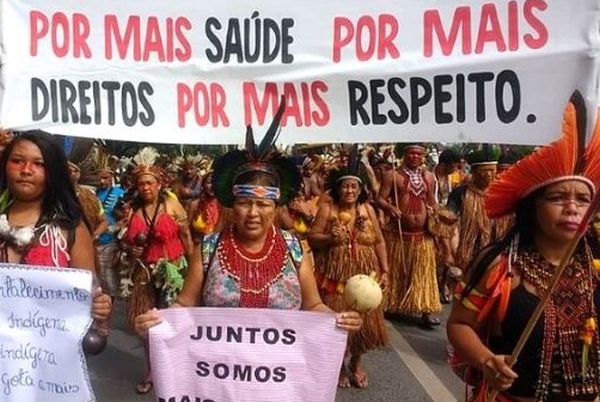
As a response to the Brazilian government’s proposal to municipalize Indigenous health, hundreds of protestors took the streets Monday and Tuesday to defend the current Subsystem under the Special Secretariat of Indigenous Health (Sesai).
On Tuesday morning, Indigenous people occupied the building of the Ministry of Health in Curitiba, joining other protests in Bahia, Porto Velho, Brasilia, and all over the country. With their banners raised, hundreds of demonstrators emphatically called for “more health, more rights, and more respect.”
“The Indigenous health subsystem is a conquest of ours, it has to do with our struggle. It does not belong to a party or certain politics, as it was built by us,” Guarani Indigenous leader, Eloi Jacinto, told Brazil de Fato.
The Special Secretariat for Indigenous Health is responsible for coordinating and implementing the National Policy on Health Care for Indigenous Peoples. Its mission is to implement a decentralized care model within the 34 Special Indigenous Health Districts.
According to the last census (2010) done by the Brazilian Institute of Geography and Statistics, approximately 817,000 Brazilians classified themselves as Indigenous, occupy 12.6% of the national territory, and speak 274 different languages. It is for this, and to break down the cultural and linguistic barrier, the Sesai created the figure of Indigenous health agents, people from the community who link ancestral health and the state system.
The Federal Government proposes to close down the Sesai and municipalize these services and Indigenous healthcare. “The municipalization will damage our health because they are not able to support the Indigenous health subsystem”, argued Jacinto.
In an official statement, the Ministry of Health said that “any changes to the health service for Indigenous peoples still are being analyzed and discussed.” However, Indigenous communities have expressed their displeasure with the way the decisions are being taken.
“The government is trying to push down the Indigenous peoples because we were not called to dialogue. Disrespecting the structure of our organizations,” added the Guarani leader.
“We have to stop walking this path in Brazil: doing things without discussing with the communities, with the people involved,” Senator Flavio Arns said Tuesday, adding that now protesters are in dialogue with the Ministry of Health.
This new proposal takes on the path of the anti-Indigenous policies that Brazil is embarking on as part of its current neoliberal and far-right government.
 Escambray ENGLISH EDITION
Escambray ENGLISH EDITION





Escambray reserves the right to publish comments.